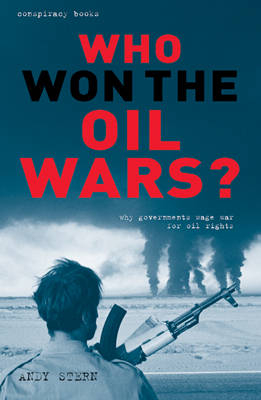
Who Won the Oil Wars?
How Governments Waged the War for Oil Rights
Seiten
2005
Collins & Brown (Verlag)
978-1-84340-291-6 (ISBN)
Collins & Brown (Verlag)
978-1-84340-291-6 (ISBN)
- Titel ist leider vergriffen;
keine Neuauflage - Artikel merken
The truth about the 100-year fight for the world's precious oil supplies. Explores all the conspiracy theories from Biafra to the War on Terror.
Since oil displaced coal as the fuel of choice a century ago, it has been the cause of some of the world’s bloodiest conflicts.
This book examines the role oil has played in these conflicts in the last hundred years. It looks at the actions governments and multinational companies have taken to secure their oil supplies since the 1920s, often provoking accusations that they promote conflict and support corrupt or violent regimes. Oil was an important factor in both world wars. Conspiracy theorists believe it also sparked the Suez Crisis, the Iran-Iraq War, the Biafra war and conflicts in Angola and Chad in which oil companies such as Elf (Angola) and various companies including ExxonMobil (Chad) are said to have played a murky role. The book starts with a look at Empire building and how at the start of the 20th century Britain, France and Germany sought to carve up the world’s supplies of ‘black gold’. The clamour for oil intensified during World War II – in fact the bombing of Pearl Harbor was allegedly at least in part to prevent Indonesian oil from reaching the US.
Successive chapters chart the rise of OPEC and the Suez Crisis in 1956, and the Cold War ‘Proxy Wars’, when the importance of Middle East drew the US and Soviet Union (then perceived as the world’s superpowers) into conflicts between states in the region.
The book also assesses the power of major oil companies – not only the huge environmental devastation they have caused but the local conflicts that have arisen. For instance, scandals involving the French oil company Elf indicate that it had funded both sides in the civil wars in Angola and the Congo. In conclusion the book looks at other sources of oil, chiefly in Latin America and sub-Saharan Africa. What effect will large-scale oil extraction have on these regions?
Since oil displaced coal as the fuel of choice a century ago, it has been the cause of some of the world’s bloodiest conflicts.
This book examines the role oil has played in these conflicts in the last hundred years. It looks at the actions governments and multinational companies have taken to secure their oil supplies since the 1920s, often provoking accusations that they promote conflict and support corrupt or violent regimes. Oil was an important factor in both world wars. Conspiracy theorists believe it also sparked the Suez Crisis, the Iran-Iraq War, the Biafra war and conflicts in Angola and Chad in which oil companies such as Elf (Angola) and various companies including ExxonMobil (Chad) are said to have played a murky role. The book starts with a look at Empire building and how at the start of the 20th century Britain, France and Germany sought to carve up the world’s supplies of ‘black gold’. The clamour for oil intensified during World War II – in fact the bombing of Pearl Harbor was allegedly at least in part to prevent Indonesian oil from reaching the US.
Successive chapters chart the rise of OPEC and the Suez Crisis in 1956, and the Cold War ‘Proxy Wars’, when the importance of Middle East drew the US and Soviet Union (then perceived as the world’s superpowers) into conflicts between states in the region.
The book also assesses the power of major oil companies – not only the huge environmental devastation they have caused but the local conflicts that have arisen. For instance, scandals involving the French oil company Elf indicate that it had funded both sides in the civil wars in Angola and the Congo. In conclusion the book looks at other sources of oil, chiefly in Latin America and sub-Saharan Africa. What effect will large-scale oil extraction have on these regions?
Louise Gale is an experienced writer editor and EU lawyer, with extensive knowledge and contacts in the international environmental field. She has written for, among others, 'The Economist', Greenpeace and GeneWatch. Andy Stern is a freelance writer with more than twenty years' experience of writing books and articles for newspapers, magazines and specialist publications on topics as diverse as international politics and business, environment, energy, media, IT and telecoms and film. The authors live in London, NW3.
| Erscheint lt. Verlag | 10.10.2005 |
|---|---|
| Reihe/Serie | The Conspiracy Series |
| Zusatzinfo | No illustrations |
| Sprache | englisch |
| Maße | 132 x 199 mm |
| Gewicht | 237 g |
| Themenwelt | Sozialwissenschaften ► Politik / Verwaltung ► Europäische / Internationale Politik |
| Sozialwissenschaften ► Soziologie | |
| Technik ► Elektrotechnik / Energietechnik | |
| ISBN-10 | 1-84340-291-2 / 1843402912 |
| ISBN-13 | 978-1-84340-291-6 / 9781843402916 |
| Zustand | Neuware |
| Haben Sie eine Frage zum Produkt? |
Mehr entdecken
aus dem Bereich
aus dem Bereich
Studienbuch
Buch | Hardcover (2023)
De Gruyter Oldenbourg (Verlag)
CHF 62,90
erfolgreiche Interessenvertretung durch Prozesskompetenz im komplexen …
Buch | Hardcover (2023)
Wiley-VCH (Verlag)
CHF 58,75


